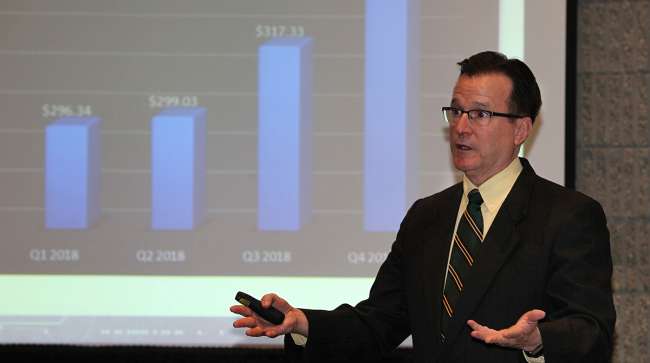TMC, FleetNet America Unveil Findings From Benchmarking Program

ATLANTA — One truckload fleet averaged more than 75,000 miles between roadside breakdowns in the fourth quarter last year, about seven times the vertical average of other carriers participating in a benchmarking program being run by American Trucking Associations’ Technology & Maintenance Council and FleetNet America.
The announcement was made March 17 during a joint press conference during TMC’s annual meeting.
At TMC? Stop by Booth 3347 for a chance to win your own Amazon Echo or Google Home device.
The BenchMarkit program — launched at TMC’s 2018 annual meeting — during its first year collected data on roadside breakdowns for truckload fleets. To participate, a fleet must agree to provide data on all roadside breakdowns and use TMC’s Vehicle Maintenance Reporting Standards to code all incidents, said Jim Buell, FleetNet’s executive vice president of sales and marketing.
The vertical average for all fleets in the program during the fourth quarter was 10,663 miles between breakdowns, slightly worse than the 4Q 2017 result of 11,007 miles but slightly better than the 9,783 miles recorded during 3Q 2018, Buell noted. However, the best-in-class performance during 2018 improved each quarter. It was 33,809 miles in 1Q and 35,956 miles in 2Q — results Buell said he was impressed with at the time — and 52,428 miles in 3Q, a result he called, “amazing.”
So, the 4Q 2018 best-in-class performance of more than 75,000 miles really caught his eye.
“I talked to the fleet that got best-in-class, and I know that they are a very thoughtful fleet, and they are using this data to understand what’s going on,” he said. “But what’s really surprising to me is that this fleet has more room to improve, because they’re not best-in-class in every VMRS system. They are looking at the ones where they are not and asking, ‘What do we need to do to get better?’ ”
FleetNet America’s Jim Buell said the benchmarking service his company launched with #TMC includes one fleet that averaged 75,000 miles between breakdowns in 4Q 2018. #TMC2019. #TMCAnnual19 pic.twitter.com/ZztqmQIHKZ — JoeHoward_TT (@JoeHoward_TT) March 17, 2019
Buell added, “I don’t know where the ceiling is, but I do know that this industry — the truckload vertical — should not be breaking down every 10,000 miles.
“From that, this gives me confidence to say to you that most fleets are having more roadside repairs than they should. Most fleets are spending more on maintenance than they should. Most fleets are having more customer experience issues than they should. Because most of them are at 10,000 miles – down here — and we’ve got one guy up here [at 75,000]. If he can run there, why can’t everybody else?”
Fewer breakdowns, Buell noted, could help offset maintenance costs that program data indicate are on the rise. In 4Q 2018, the average cost per mechanical repair reached $334.20, its highest level since the benchmarking program launched. The cost was $311.37 in 4Q 2017, then dropped to $296.34 in 1Q 2018. The number then increased each quarter for the rest of that year, to $299.03 in 2Q and $317.33 in 3Q.
The vehicle systems with the most unscheduled repairs reported during the program:
-
cooling
-
wheels, rims, hubs and bearings
-
brakes
-
lighting systems
-
tires, tubes, liners and valves
The largest cost increase among the top 10 VMRS systems during the program’s first year included lighting (+12%); cab and sheet metal (+8%) and trim and miscellaneous hardware (+36%), the two reported.
And, as Buell noted, roadside repairs already command a premium
“On the average, it costs about four times as much to repair something on the side of the road than in your shop,” he said. “You’ve got to bring somebody out there, pay somebody their retail labor rate, and they charge more to do something on the side of the road because it’s dangerous and scary.”
He added, “I believe understanding your roadside failures gives you greater insight into your overall maintenance operation. I get that a tire would fail on the side of the road; you hit some debris. But did the brakes really have to fail on a route? I don’t think so.”
TMC Executive Director Robert Braswell noted that BenchMarkit is a benefit for TMC members. According to Buell, the program has enough data to expand into less-than-truckload and tanker fleets.


